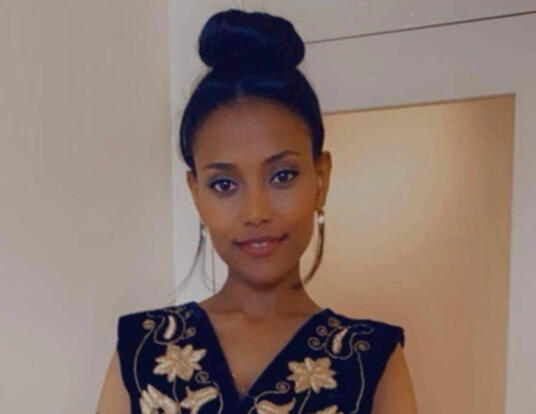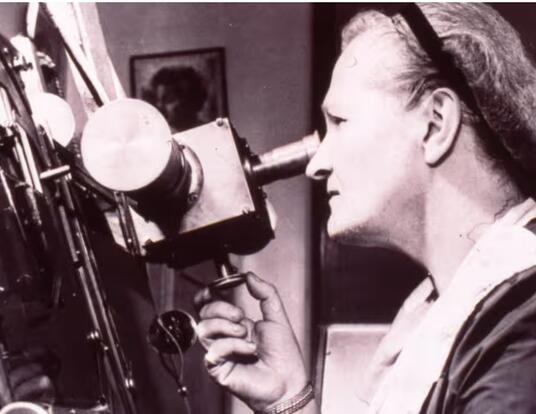For Every Mother, A Good Childbirth
Transforming maternal care in India
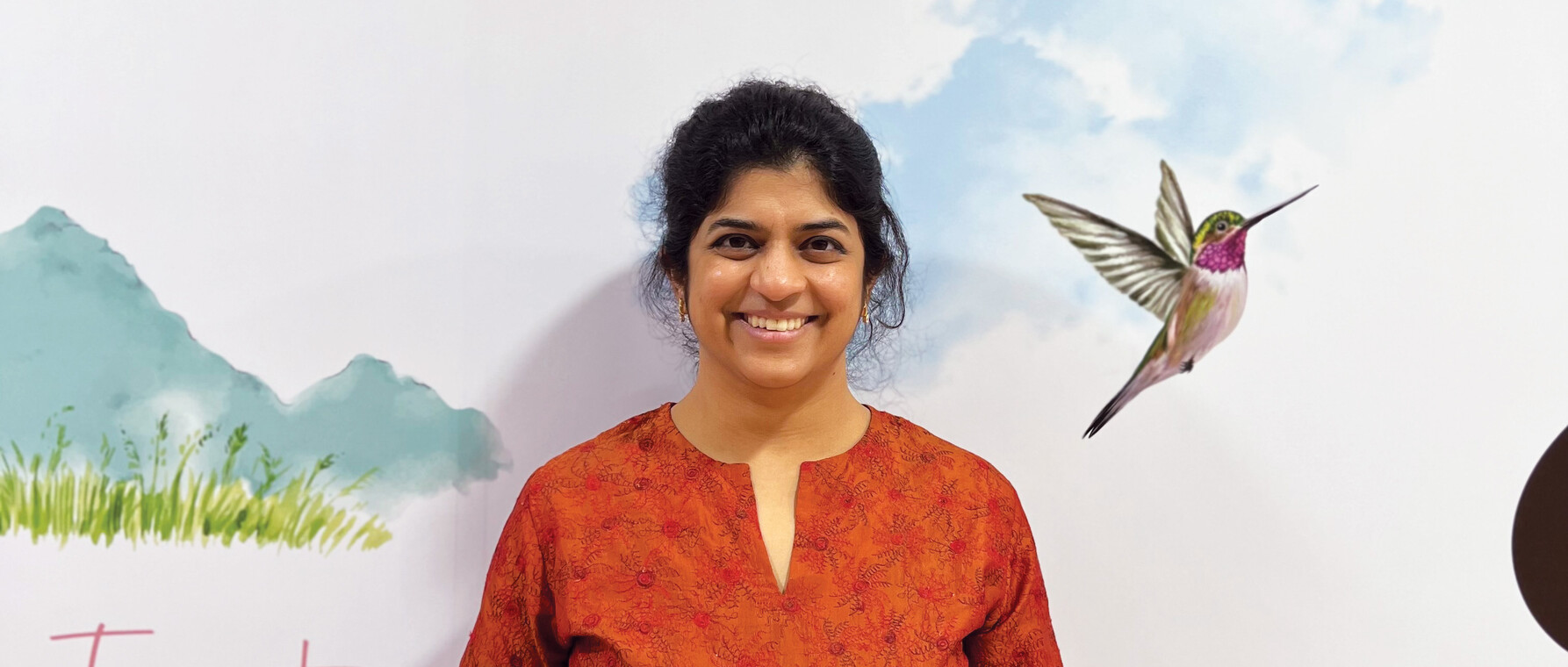
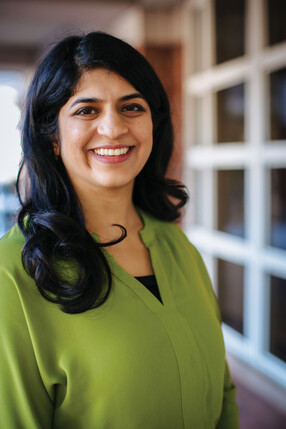
Janhavi Nilekani wanted the childbirth of her dreams. That meant returning in 2016 to her home country of India where the then-fifth-year PhD student in public policy at Harvard’s Graduate School of Arts and Sciences (GSAS) could be closer to family, ensure her forthcoming baby’s citizenship, and get away from the darkness and cold of the New England winter. It also meant finding a healthcare provider committed to evidence-based medicine—and treating expectant mothers with respect. Nilekani particularly wanted to avoid delivery by cesarean section, which is performed in India much more frequently than in high-income countries. She was frustrated in her search until she connected with a US-trained midwife and a local Indian obstetrician dedicated to giving her the birthing experience she was determined to have. To get it, however, Nilekani says she needed to leverage all of the research and analytical skills she acquired as a PhD student at GSAS.
“My work at Harvard gave me the training I needed to study childbirth in an evidence-based way,” she says. “It gave me the ability to do a cost-benefit analysis and make decisions. And, maybe above all, the concept of smart policy design and implementation that I learned while a student at GSAS taught me that if I wanted a respectful, evidence-based childbirth, the incentives of all the actors had to be aligned.”
Today, as the founder and chairperson of the Bangalore-based Aastrika Foundation, Nilekani, PhD ’18, leverages her graduate education and personal experience to advance an audacious vision: “a future in which every woman is treated with respect and dignity during childbirth, and the right treatment is provided at the right time.” If she’s successful, Indian mothers won’t need a Harvard PhD to receive the same high-quality maternal care that she did.
The Birth of a Social Entrepreneur
By the time Nilekani graduated from GSAS in 2018, she knew her path would lead her not to academia but back to Karnataka, a state in India, where she could have a direct impact on her home community. She turned down a raft of offers from prospective employers and started the Aastrika Foundation one year after she accepted her GSAS degree in Harvard Yard.
“‘Aastar’ is the Sanskrit word for expansion,” she says. “‘Urmika’ means wave. So, the contraction ‘Aastrika’ represents the foundation’s mission to create a sea change in maternal care that will ripple out and transform the birthing experience for mothers across India.”
Rema Hanna, the Jeffrey Cheah Professor of South-East Asia Studies and one of Nilekani’s mentors, says that she’s not surprised that her former student decided to use her PhD skills and knowledge for the common good.
“Harvard doctoral students gain frameworks that help them use evidence in the policy space, statistical skills that help them use data and information to generate that evidence, and mentoring that helps them translate the statistics to knowledge that policymakers can understand,” she says. “But even as we use data, we don’t lose sight of the fact that the goal is ultimately to improve people’s lives.”
In India and many middle-income countries, Nilekani says, physical and verbal abuse of birthing mothers and a disregard for patient privacy are common. “Shouting at people, slapping, pinching, breaches of confidentiality, women being half-naked in rooms just waiting to give birth—it’s all standard,” she says. Many Indian women and babies also have insufficient access to care, what Nilekani calls the problem of “too little, too late”: no hospital near their home, a shortage of nurses and supplies, a lack of training for health professionals, or other obstacles to care. At the same time, Nilekani says Indians also suffer from over-intervention in childbirth, excessive medicalization, and excessive treatment— particularly excessive surgery.
“The cesarean rate in the United States is about 32 percent,” she says. “There are three states in India with private sector c-section rates of more than 80 percent. For most of these women, it’s unnecessary. The morbidity and side effects—along with the downstream health consequences for the next child and the costs for the health system—make it a very suboptimal deployment of resources.”
My work at Harvard gave me the training I needed to study childbirth in an evidence-based way. It gave me the ability to do a cost-benefit analysis and make decisions.
-Janhavi Nilekani
The Aastrika Foundation tries to address the crisis in Indian maternal care by tackling these three challenges. At the center of its effort is midwifery. Nilekani points to a report from the United Nations Population Fund asserting that midwives trained to international standards can provide up to 87 percent of essential birth care to women and infants. Dr. NachiketMor, a visiting scientist at the Banyan Academy of Leadership in Mental Health in Chennai, India, who works at the intersection of healthcare and finance, says midwifery is critical if middle-income countries like India, are to improve rates of infant and maternal mortality—and do so affordably.
[related-images]
“The current approach in India either attempts to deliver babies at primary care centers that have low volumes, lower skill levels, are less well-equipped, are far away from hospitals, or at hospitals where the first preference of obstetricians is to intervene surgically to deliver babies,” he says. “These approaches are responsible for the poor outcomes and waste observed in the Indian health system. There is a need to move all births to well-equipped high-volume midwife-run centers at which high-quality routine births are the norm and from which mothers can be moved quickly to hospitals should more advanced interventions— including c-sections—be required.”
Upskilling at Scale
Aastrika’s strategy is two-pronged. On the supply side, the foundation seeks to dramatically upskill nurses and midwives to meet the need for those providers across the country. At the same time, it looks to create demand for high-quality care among expectant mothers.
To achieve its upskilling goals, Nilekani’s foundation has collaborated with the government of Karnataka to establish a national midwifery training institute in Vanivilas Hospital, the state’s largest facility for women and children. Aastrika is also developing high-quality resources that use the latest adult pedagogy to provide skills training to both aspiring and active nurses and midwives. Finally, the foundation hosts the Aastrika Sphere, a digital learning site recognized by the Indian Nursing Council for continuing education credits. Aastrika Sphere is free to use and includes courses on pain management, breastfeeding, normal labor and delivery, mental health, and many other aspects of the birthing experience. Aastrika partners with public health organizations across the globe, including the Fernandez Foundation, the United Nations Fund for Population Activities (UNFPA), the Denmark-based Maternity Foundation, and others to populate the platform with high-quality content.
“Both WRA India and Aastrika Foundation believe that respectful maternity care (RMC) is a universal human right for all childbearing women and their newborns,” says Dr. Aparajita Gogoi, national coordinator for theWhite Ribbon Alliance for Safe Motherhood India, one of Aastrika’s institutional partners. “To ensure that the healthcare system in India is strengthened to provide respectful care, we collaborated to create an e-learning program for healthcare providers aimed at institutionalizing RMC as a standard of care. We believe that Aastrika’s commitment to upskilling will go a long way in improving the childbirth experience.”
Aastrika has its most direct impact on maternal care by providing it to pregnant women in Bangalore at the Aastrika Midwifery Centre (AMC). Nilekani says that women who cross AMC’s threshold have a radically different experience than those at virtually any other hospital or health center in India. They are treated by a staff trained in and committed to ethical, evidence-based, patient-centric healthcare. That care takes place in the context of operational protocols that were recently recognized by the International Childbirth Initiative—and in a space that won the 2022 Healthcare Environment Award from the Center for Health Design and Healthcare Design magazine. Finally, the performance of AMC’s staff and the validity of its protocols are constantly evaluated through a rigorous process of data collection, audit, and quality improvement, informed by Nilekani’s work in economics and public policy at GSAS.
A future in which every woman is treated with respect and dignity during childbirth, and the right treatment is provided at the right time.
-Aastrika Foundation Mission Statement
The result of all these efforts, according to AMC mother Dr. Shreya Upadhyay, is respectful maternity care and a woman-centric experience. An assistant professor at Christ University, Bangalore, Dr. Upadhyay delivered her first child via c-section and came to the Aastrika Midwifery Centre intending a vaginal birth for her second. She ended up choosing to undergo another c-section after 36 hours in labor, but she says that was the difference between a hospital and AMC; she chose the treatment that was right for her.
“There is a very high priority on mother-centric caregiving that I have not seen elsewhere in India,” Dr. Upadhyay says. “I was conscious and living the moment, my husband was in the operating theater, and just after birth, my baby was nursing contentedly at my breast. My experience at Aastrika was one of mindful caregiving. It is something that women in India need.”
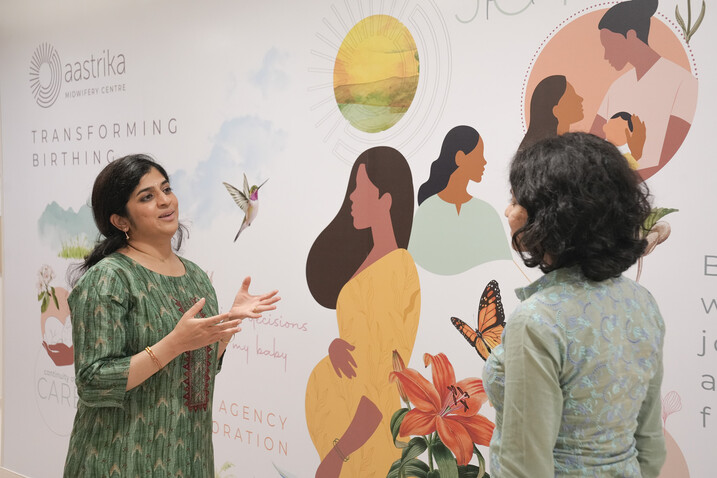
A Vision of Care
Aastrika is well-positioned to meet that need in the years ahead, says Dr. Evita Fernandez, chairperson of the Fernandez Foundation, an NGO that works to “humanize childbirth” in India.
“Aastrika’s approach, like that of the Fernandez Foundation, is long-term and sustainable,” she says. “The midwife-to-patient ratio in India remains too low compared to the World Health Organization’s (WHO) recommendations. By 2030, WHO predicts that it will fall even more. In the coming years, Aastrika must keep working towards their vision of promoting midwifery, providing training and education, and respectful maternal care.”
Fulfilling a vision of better maternal care is exactly what Nilekani intends to do in the near future. Her goal in the next five years is for Aastrika to upskill around 200,000 health professionals in evidence-based care and to train 1,000 new midwives. “We have so far had 8,000 learners after only three and a half years, and we are on a pathway to much more,” Nilekani says. “We want our programs to touch thousands of existing professionals to make them better at their work. We also want our efforts to lead to scores of new midwives in India, either by training them directly or by training faculty who teach others.”
In the 18 months since its founding, AMC has established a culture of high-quality care, delivered in the right amount at the right time. In fact, at 21.2 percent, the rate of Nulliparous Term Singleton Vertex c-sections at Aastrika—defined by the California Maternal Quality Care Collaborative as “live babies born at or beyond 37.0 weeks gestation to women in their first pregnancy, that are singleton,” and not in the breech or transverse positions—is lower than the current US average of 25.9 percent. Now the challenge is to fill the facility with new and expectant mothers. Midwifery is not new to India—or in many middle-income countries. So far, though, Nilekani says it has not received much attention either from the Indian nonprofit community or from mothers-to-be. That’s why Aastrika works on the demand side to make people aware of midwifery—and also of the crisis in maternal care.
“Increasingly, much of my time is spent speaking at conferences, giving interviews, and pulling together key statistics to inform media coverage,” she says. “We’re also hosting more conversations about the issue, like our recent event at the Bangalore International Centre, which is a hub of intellectual life in Karnataka. Currently, there isn’t even a shared understanding in India that it’s a good thing to get better healthcare, that women having better health is a reasonable thing for our society to work towards, or that it’s worth the time and the money. That’s part of the demand-side challenge that we’re looking to address with our advocacy.”
Changing minds is always the greatest challenge a leader can face. On the other side of that transformation, though, is a more humane world—for mothers, their children, and for nearly 1.4 billion of the world’s people.
"Imagine a world where no woman is disrespected during birth or is plied with unnecessary medical interventions,” says Dr. Evita Fernandez. “She has a birth of her choice with her preferred partner. What Aastrika is doing will change the face of maternity care in India. Isn’t that going to improve everybody’s lives?”
Photos courtesy Aastrika Midwifery Centre
Get the Latest Updates
Join Our Newsletter
Subscribe to Colloquy Podcast
Simplecast



